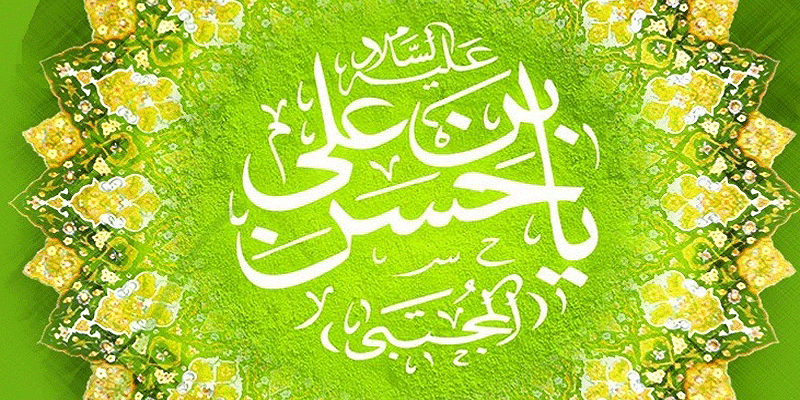Imam Hasan was the first child of Fatimah. He was born in Ramadan, in the second or the third year of hijra.
When the Prophet was informed about this blessed newborn child, he was very pleased and delighted. He hurried to Fatimah’s house to congratulate her. Arriving in the house, the Prophet said to Asma’, ‘bring me my son!’
Asma’ brought Imam al-Hasan wrapped in a yellow piece of cloth. The Prophet took him, joined him to his chest, kissed him, raised his (the Prophet) hands towards the heaven and said, ‘O Allah, I ask You to protect him and his posterity from cursed Satan.’
Then the Prophet recited the azan in the right ear of his blessed newborn child and the eqama in his left ear. This child of prophethood received the world of existence with the highest psalm; it was “Allahu Akbar; Allah is Great, and la illaha illallah; there is no god but Allah.”
The Prophet asked Imam Ali, ‘Have you named this blessed child?’
Imam Ali replied, ‘I would not precede you, O messenger of Allah.’
The Prophet said, ‘And I would not precede my Lord.’
It was no long when Gabriel came down to the Prophet carrying with him the name from Allah. The angel said to the Prophet, ‘Name him Hasan!’
Seven days after the birth of the Prophet’s grandchild, the Prophet came to his daughter’s house to endow his grandson with some honor. He slaughtered a ram as a sacrifice for him. It was the aqiqah that has become a tradition since then until now. Then he cut the hair of his grandson with his holy hands and gave silver, inasmuch as the weight of the hair, to the poor. Then he surnamed him (gave him a kunyah) as Abu Muhammad. Imam al-Hasan had no kunyah other than this one.
His Education
The Prophet brought up and educated his grandson Imam al-Hasan and fed him with his own ideals. The other educator of Imam al-Hasan was his father Imam Ali who was the best educator in the world of Islam after the Prophet. He also fed in his son his high ideals and morals. His mother Fatimah too, educated him with the loyal faith and the deep love to Allah the Almighty. Therefore, he was a copy to these three great, infallible persons.
His Generosity
Imam al-Hasan was one of the most generous people, the kindest, and most charitable to the poor and the wretched. He did never reject a beggar at all.
Imam Abu Muhammad al-Hasan was also too patient. He met whoever wronged him with pardon and kindness. Historians have mentioned many stories on this matter.
Imam al-Hasan was a true copy of his grandfather the Prophet (S) in patience and morals.
His Asceticism
Imam al-Hasan turned his back to the pleasures of this worldly life and turned devotedly towards Allah the Almighty. It is related that he had said: “A bit of poor bread sates me, and a sip of water suffices me, and a piece of thin clothe covers me when alive, and when I die, it is enough as a shroud.”
Imam al-Hasan offered all that he had just to please Allah the Almighty. He gave all his possessions two times, and divided his properties with Allah three times…
His Worship
Imam al-Hasan was the most worshipping one in his time. Historians say, ‘He was not seen at any time unless he was mentioning Allah the Almighty’ and that when he recalled the Paradise and Hell, he became confused and upset as if he was ill, and so he prayed Allah to take him to Paradise and protect him from Hell. When he recalled death and what would come after it, he cried a crying of an afraid repentant. When he recalled the standing before Allah on the Day of Resurrection, he sighed so deeply until he fainted.
When he wanted to perform wudu’ (ablution), he changed color and he trembled. He was asked about this and he said, ‘He, who stands before Allah the Lord of the throne, must tremble and his color fade.’
When he finished his wudu’ and set towards the mosque, he prayed Allah by saying, ‘O my Lord, your guest is at Your door. O Beneficent, the wrong doer has come to You, so forgive the badness we have with the goodness You have.’
When he stood to offer the prayer, fear overcame him until all his organs trembled. After offering the Fajr (dawn) Prayer, he did not utter save the mention of Allah until the sun shone.
He had performed the hajj to the Inviolable House of Allah (the Kaaba) twenty-five times on foot though he had best camels. He was asked about his going too much on foot to the Kaaba and he said, ‘I feel shy of my Lord not to go to His House on my feet.’

